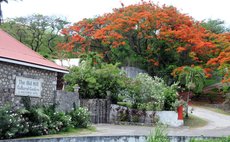Reflections on "Contemplation upon flowers"
The above is the title of a truly inspirational poem by Henry King of Guyana which has been, and is being studied, by CXC English B/ Literature students. This poem I compare to some of the Psalms that speaks to our souls and one which pays tribute and reverence to the Creator in all things:
"Brave flowers that I could Gallant it like you and be as little vain"
This appreciative and contemplative introduction clearly allows readers to focus on something we take for granted particularly as we live in a nature isle: flowers. But can we dress or adorn ourselves as the flowers? The great King David of the Bible tells us that with all his might and riches he could not, yet we care about things we have no control over. Not the flower, however; he traverses life's road and still be "as little vain" in all its unsurpassed beauty. So many of us are blessed with other 'beauties,' well-endowed physically, talented, positions of authority, money and really flaunt it for the world to see. We are vain about it, not giving a single thought that it could be taken away from us at an instant.
The poem goes on:
"You come abroad and make a harmless show, And to you bed of earth again You are not proud, you know your birth For your embroidered garments are from the earth"
Ha! We always seem to forget it's all earthly and we are eaten up with pride and have forgotten our humble birth, the earth, the ghetto for whence we came. This poem clearly illustrates that life requires a higher calling, a higher service, submissiveness to a much larger divine will:
"You do obey your months and times, but I Would ever have it spring My fate would know no winter, never die Nor think of such a thing."
How true is this revelation from author Henry King. Our lack of submissiveness to a will and a maker higher than man determines that we always want things to be blossoming in the spring and never prepare and give thanks in the "winters ' of our life; failure, sickness, disappointment . Oh no it always has to be our way or the high way and refuse to bow in the winter failing to recognize in everything there is a season and spring will return once more to those who believe.
Our lack of believe is evident by our extremes to win an election, to get promoted on the job to, to appear to be young: we dye our hair, perform numerous plastic surgeries to cheat time and prolong the inevitability of being old. But can we change our 'winters 'or do we gracefully accept recognizing that we had our 'spring' and 'summers' even as flowers do. Do things change or we get younger because in our twilight years we use positions of wealth or authority to flirt with young ladies or young men? Or is it just a perception of well-being? After all the Creator says that if he can take care of these flowers, birds, bees who mean less to him, won't he also take care of those who trust him?
"Oh that I could my bed of earth but view And smile and look as cheerfully as you"
A human weakness we all have but it's even greater when we perceive this is the end and don't believe that there is nothing after or have prepared our life for such. The flower knows that it had done its job and even in its death it can smile as the remains fertilize and bring forth a new beginning. The poem causes us to reflect whether we can say the same as we look at impending old age and eventual death.
So then, can we be as assured as the flower, that even in death we would have perfumed the earth and not be just be a rotting corpse; an uninspiring life that has not stimulated positive change or impacted on souls? Is envy, wickedness, jealousy and hate the scents nostrils will remember when we are at our bier? No matter what prayers are said to Mother Mary …we would have passed this way already. And so the poet pleads to the flower on behalf of me, all of us, for it's easier said than done but a life we should all pursue in simplicity and acceptance; of the high and lows in war to make peace not enemies, without bitterness in the end:
Oh teach me to see death and not to fear But rather to take truce How often I have seen you at a bier And there look so fresh and spruce Your fragrant flowers then teach me that my breath Like your may sweeten and perfume my death.
So readers, next time you past a flower stop, reflect, and contemplate, for even through the art of poetry writing, the life of a flower can inspire us all.
(If you have a response email idol_starliner@hotmail.com . Tell me what you think!)




